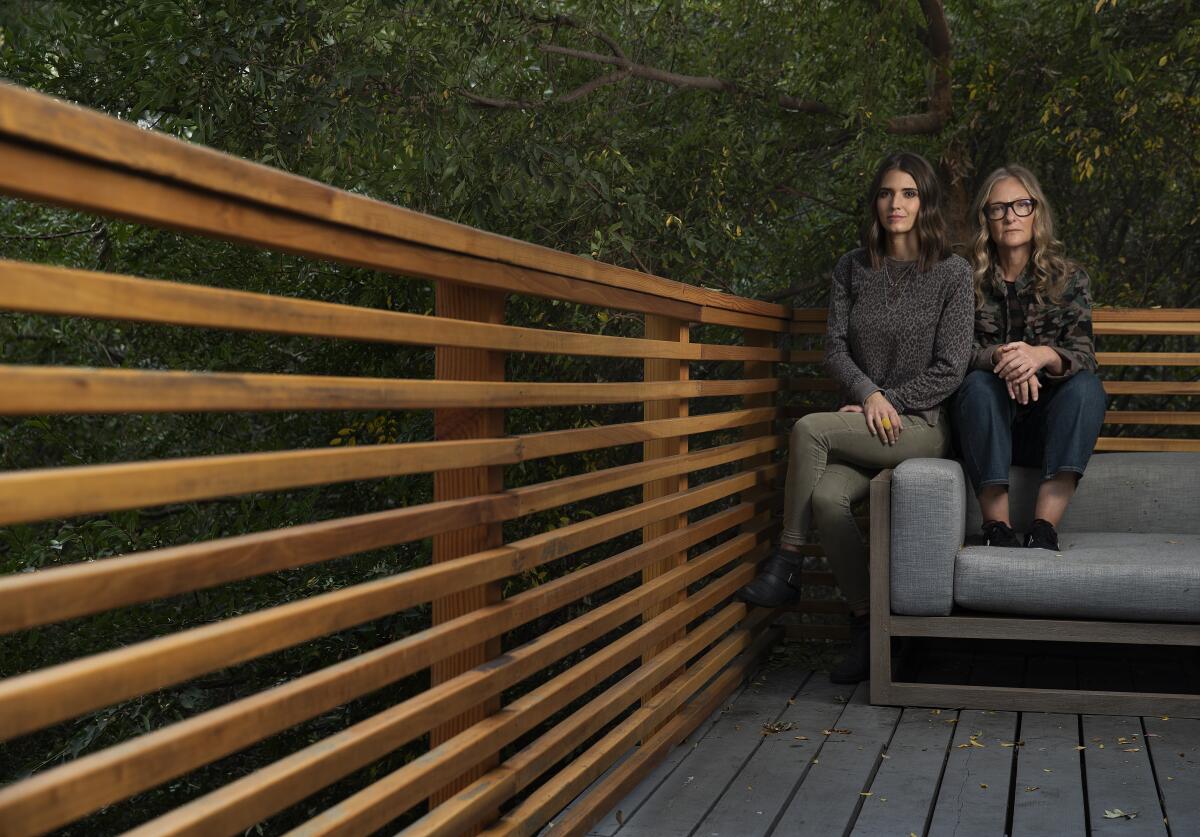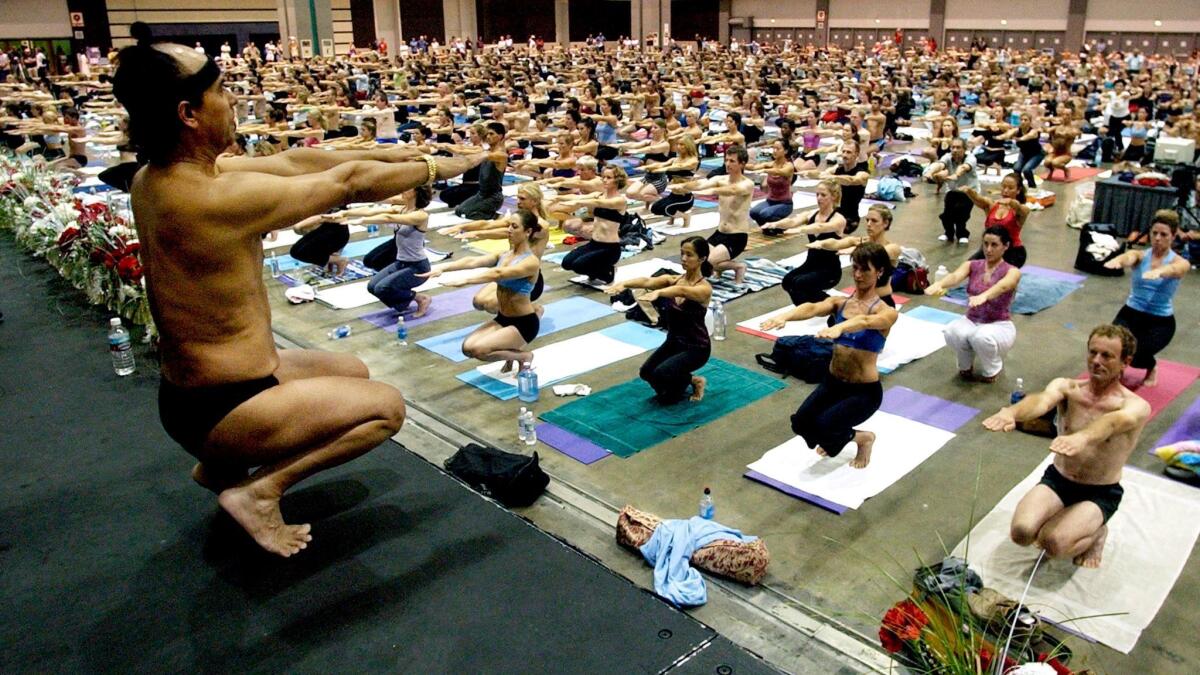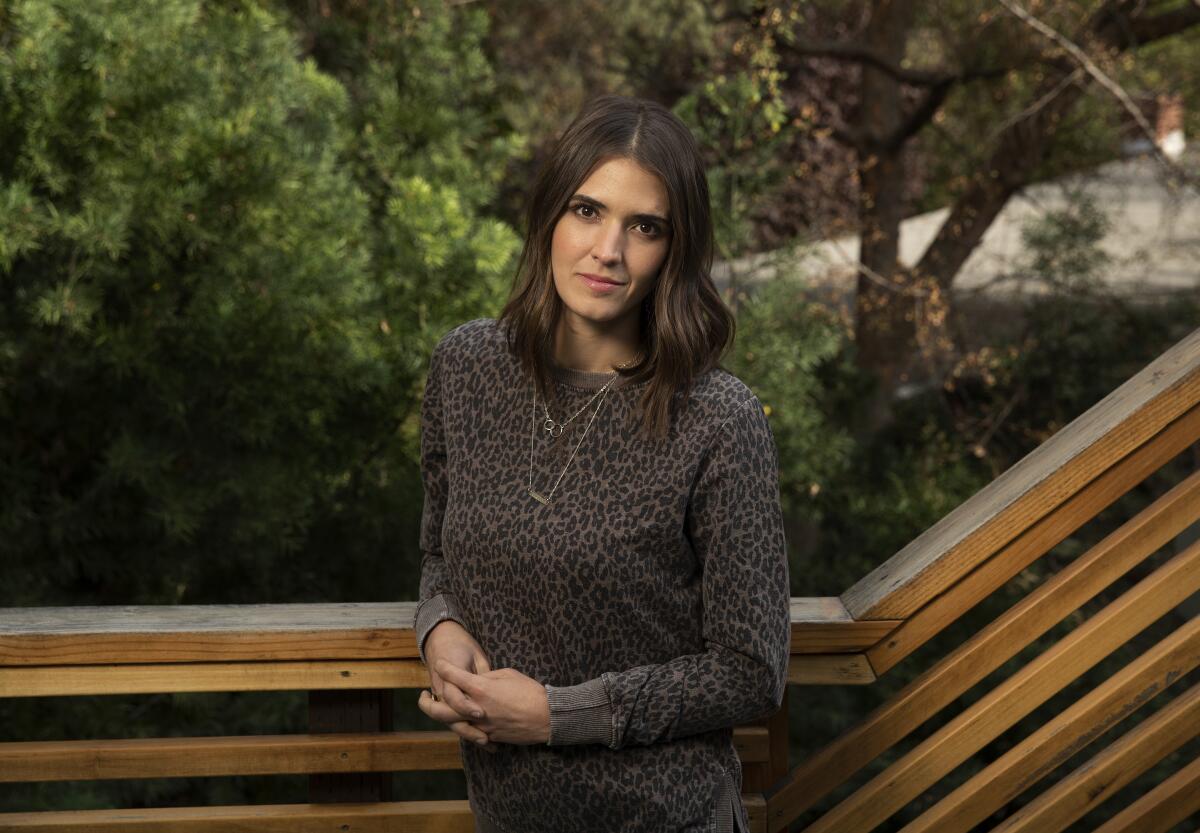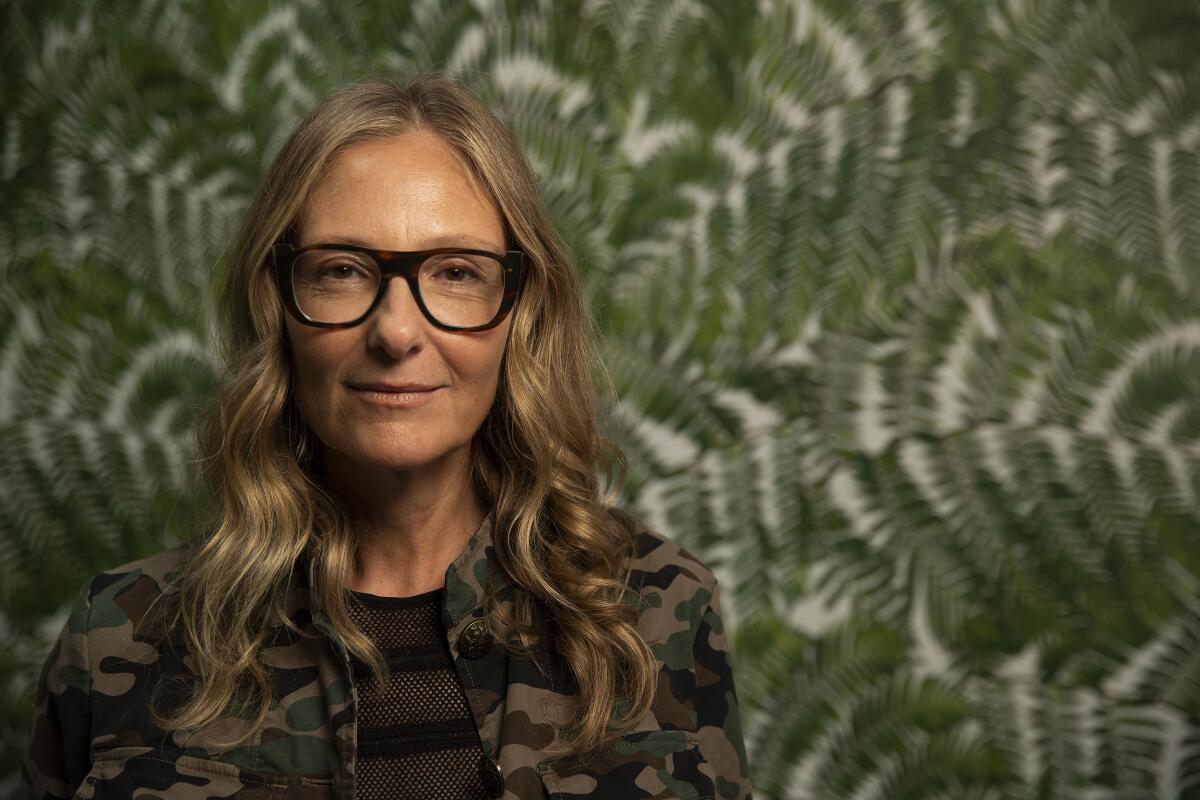In #MeToo era, new documentary delves into sexual misconduct charges against Bikram yoga founder

- Share via
Sarah Baughn still wanted to teach yoga, even after it all. After she said that Bikram Choudhury, the infamous Indian guru behind the hot yoga phenomenon, sexually harassed her. After she became the first of the yogi’s followers to publicly accuse him of misconduct, filing a lawsuit that would inspire numerous other women to follow in her footsteps. After settling out of court with her former mentor, who continues to deny any wrongdoing, accepting what she said was a payment meant to make up for what he had allegedly done to her.
She still wanted to teach yoga because it had transformed her. She’d found the practice in 2004, when she was 20 and in her second year of college, battling scoliosis. After a few Bikram-style classes, her spine began to feel better, and she became “two-classes-a-day obsessed.” She dropped out of college in Washington, moving to Los Angeles to learn from the guru himself.
So even a decade later — when Bikram had come to mean something very different to her — she wanted to stick with teaching. But then one day in 2014, during a class she was leading, a student approached her during the water break. The pupil told Baughn she’d found the instructor’s classes so impactful that she had just become a Bikram-certified teacher herself.
“And in a split second, it all flashed through my head,” Baughn, now 34, recalled. “You’re a teacher because I inspired you. I put you at risk because I was good at [what] I did, and I made you want to do this too. How can I go on doing this? I walked out of that class in tears, and I knew it was the last class I would ever teach.”
Baughn was sitting on the deck at director Eva Orner’s home, leaves from a tree overhead continually landing in her hair. She felt comfortable here, right next to Orner, because she’d been to the filmmaker’s Nichols Canyon house before. Last year, she and a handful of other women who claimed they’d been sexually harassed by Choudhury sat for interviews with her for the documentary “Bikram: Yogi, Guru, Predator.” The film, released Wednesday on Netflix, details Choudhury’s rise to fame and subsequent fall — beginning with the cult following he gained among Hollywood celebrities like Shirley MacLaine, Quincy Jones and Barbra Streisand, and detailing the later accusations by Baughn and other women of sexual misconduct by Choudhury.

Richard Hillgrove, a U.K.-based publicist who said he had been retained to represent Choudhury, affirmed that Choudhury has watched the Netflix film. “Bikram Choudhury totally refutes all the allegations of sexual misconduct and harassment presented in the film and is deeply upset by the continued character assassination,” Hillgrove said in an e-mail. “Bikram believes that the concerted effort by money-motivated lawyers to proactively send letters to a database of all his clients, offering people free legal representation and the promise of $1 million insurance policy pay-outs is the primary motivation for this reputational catastrophe. Bikram believes the Netflix film is nothing more than a repetition of old material.”
An eccentric figure who taught classes in only a black speedo, Choudhury was known for tough love — a style that Orner’s film says often toed the line toward emotional abuse. In the documentary, his former students recall how he’d openly mock those who paid to learn from him: “What are you doing for your fat [expletive] stomach?” or “You need a pedicure.” Further, the film alleges, he’d encourage students to work so hard in the studio — a room heated between 95 and 108 degrees where all were scantily clad — that they got dizzy, nauseous and would sometimes vomit. Those who had to urinate, the documentary says, were told to tie strings around their penises or put corks in their vaginas to stop their bodily urges, forcing some to pee in their water bottles midclass.
Behind closed doors, Orner’s film alleges, Choudhury’s behavior was even worse. During his nine-week teacher training sessions — which cost between $10,000 and $14,000 and took place at remote locales — he would reside in the presidential suite of the hotel where the students were staying. At night, many students claim in the documentary, he would invite his favorite pupils to his room and ask them to massage him. One of those students was Baughn.
According to the 2013 lawsuit she filed in L.A. County Superior Court, Choudhury expressed interest in her as early as her fifth day of 2005 teacher training. He called her into his office, she said, asking: “Should we make this a relationship? … I have never, never felt like this about anyone.” She was so distressed that she approached a staff member who oversaw teacher training to report the behavior, but he told Baughn to “separate the man from the teacher.”
So she stayed with it, even attending Thanksgiving at Choudhury’s home that fall. That night, after his wife had gone to bed, the legal complaint says, Choudhury “embraced [Baughn] from behind and pressed his penis into her leg.” After she told him she was not interested, he replied: “You will never be champion without me.” Similar behavior occurred again in 2008, Baughn said, when while assisting at an Acapulco training he “grinded his penis against her leg” while trying to trap her in his hotel room.

When Baughn went public with her lawsuit, it was picked up by many high-profile news outlets, and she even sat for television interviews with “Nightline” and CNN. But even as more women came out of the shadows, filing their own claims about Choudhury — all of which the 75-year-old has vigorously denied — the accusations against him did not seem to seriously damage his reputation. He never faced a criminal trial in Los Angeles.
“In 2013, a case was submitted to the District Attorney’s Office for filing consideration,” Greg Risling, a spokesperson for the Los Angeles County district attorney’s office. “At that time it was determined that there was insufficient evidence to file criminal charges.”
“It was just before #MeToo, and what got me was the fact that he got away with it,” said Orner, describing her interest in the subject. “And we were in production while #MeToo happened, so I started thinking, ‘Oh, God. This is so much more relevant now.’ These women who were so young came out in 2013 at a time when women weren’t doing this, and they had no support. No one was saying ‘Yay, girls!’ Everyone was questioning them, calling them liars, they were all vilified. And more importantly, they lost their friends, their communities, their livelihoods. I just thought in this pre-Harvey [Weinstein] trial, post-#MeToo world, it’s such a dire warning.”
The only Bikram accuser to have her day in court was Minakshi Jafa-Bodden, who sued Choudhury for gender discrimination, wrongful termination and sexual harassment during her time working as head of legal and international affairs at his yoga school from 2011 until 2013. After she won the civil case, Jafa-Bodden was awarded a $6.8-million judgment — but as she describes in the documentary, she has yet to receive a penny, despite dozens of international efforts to serve Choudhury with legal documents. Following the case, the yogi fled the U.S. after a warrant was issued for his arrest and is now a fugitive.
“He’s lost his beloved America and Beverly Hills. That was his thing, the American dream, the cars, the life, he was a celebrity here — that’s gone. But he still lives a big life,” Orner said. “He travels constantly.... He gives talks all around the world, he still makes millions a year.”
Hillgrave confirmed by email that despite his fugitive status, Choudhury travels freely outside of the U.S. and still runs teacher training sessions. He said his client — who declined an interview — was in Mexico but would be traveling to London for a Dec. 10 press conference. “Then he’s going to Luxembourg. Then he’s back to London. Then off to Thailand,” Hillgrave continued. “He’s permanently traveling around the world.”

Orner — whose Oscar for producing 2007’s best documentary winner “Taxi to the Dark Side” rests at the foot of her fireplace — said she had trouble persuading the yoga community to participate in the film despite the allegations against Choudhury. She approached the five owners of hot yoga studios in L.A. that still tout Bikram’s name, but none would speak to her.
Larissa Anderson, who claimed in a 2013 lawsuit that Choudhury raped her in 2011, admitted she was hesitant to share her story with Orner at first too.
“You’re kind of putting your life experience in somebody else’s hands and you hope that they are going to honor you as a person and what you went through,” Anderson said via telephone from her home in Washington. “But I want the conversation to continue, and I want him to be stopped. Or at least minimize opportunities he can [abuse] somebody else. And that’s always been the driving force.”
Once Baughn connected with Orner, she said, she warmed to the filmmaker instantly — “and part of it was her Australian accent.” She also wasn’t afraid to curse, which Baughn liked.
“She just was real, and she was mad — she was mad for me,” Baughn said. “A lot of the other interviews that I did, they were kind of like so neutral — ‘that’s really hard, I’m so sorry.’ But are you so sorry? I can’t read your expression, because that’s your job. Eva was like, ‘What the hell? This isn’t OK.’”
Orner isn’t one to hide her anger — especially toward L.A. County District Attorney Jackie Lacey, who she feels has “failed” in protecting the women in her community.
“I want to put pressure on Jackie Lacey to at least re-open the case and go after him,” she said. “She’s never spoken to this. I approached her so many times. [Governor] Gavin Newsom has to say, Jackie Lacey, ‘What the [hell]? What’s up? Just tell us why you didn’t go after him.’ I think it’s important to talk about it. And the fact that she’s a woman, to me, is horrifying and so disappointing. I wanted to go after her. It really made me mad.”
Lacey did not respond directly to The Times’ request for comment, but her spokesperson, Risling, said that her office was “unaware of any ongoing investigation” into Choudhury. “[H]owever,” he continued, “if law enforcement presents anything to our office, a complete and thorough review will be conducted. If it is determined that there is sufficient evidence to file charges and prove those charges beyond a reasonable doubt, the District Attorney’s Office will take the appropriate steps to bring Mr. Choudhury to justice.”
Orner thinks it’s unlikely that Choudhury will be extradited but is hopeful her film will make his face so recognizable that he’s at least “heckled and challenged” in public. “I think the film will have an effect on his life because it will be seen by a lot of people, and that gives me some solace,” she said.

Like a true yogi, Baughn is more zen about her relationship to Bikram.
She insists she wishes Choudhury well, because if he “could get better, he could stop doing this.” She even attended a non-Bikram yoga class recently for the first time in years. She’s currently living with her parents and her three kids in Washington because her “marriage just fell apart” and is the midst of a divorce. But during a challenging time in her personal life, Baughn said the release of the documentary had provided unexpected closure.
“It closed that chapter,” Baughn said. “I’ve grown so strong from that chapter, and to then step into this difficult new chapter — it’s the perfect timing to wrap that up. I can say: ‘I have my two feet on the ground, and I’m so strong and capable. You don’t even know now what I’ve become.’ I can go ahead and become it, because that’s put away.”
“You said to me after you watched it: ‘I never got to have a trial, and this was the closest I got to having a trial,’” Orner added. “Because this is a [crappy] experience. Not that it’s winning or losing, but you didn’t get justice. That’s why I’m angry. That’s why I’m not zen. He got away with it, and that makes me very angry.”
Indeed, Hillgrove asserted that Choudhury is thriving and even credited the film though it’s been streaming less than 48 hours. “Bikram yoga is certainly going through a renaissance worldwide,” he insisted. “The attention created by the much talked about Netflix documentary, ‘Bikram: Yogi, Guru, Predator,’ has had the opposite effect that many people expected. Droves and droves of people are wanting to experience Bikram Hot Yoga. Despite the somewhat unfair and negative sentiment, Netflix has certainly helped to create a Bikram comeback.”
More to Read
Only good movies
Get the Indie Focus newsletter, Mark Olsen's weekly guide to the world of cinema.
You may occasionally receive promotional content from the Los Angeles Times.











